ICJ KENYA STATEMENT ON THE UNITED REPUBLIC OF TANZANIA’S INTENTION TO WITHDRAW FROM THE DECLARATION ALLOWING CITIZENS AND NON-GOVERNMENTAL ORGANISATIONS TO DIRECTLY FILE COMPLAINTS TO THE AFRICAN COURT ON HUMAN AND PEOPLES’ RIGHTS
The Kenyan Section of the International Commission of Jurists (ICJ Kenya) has learnt with deep regret of the intention by the government of the United Republic of Tanzania to withdraw its declaration under Article 34(6) of the Protocol to the African Charter on Human and Peoples’ Rights on the establishment of an African Court on Human and Peoples’ Rights (The African Court).
The Tanzanian Minister of Foreign Affairs and East African Cooperation, Prof Palamagamba Kabudi, signed the notice of withdrawal on 14 November 2019 and the notification was sent to the African Union on 21 November 2019.
The United Republic of Tanzania entered a declaration in conformity with Article 34(6) on 9 March 2010 which reads as follows, “The Court may entitle Non-governmental Organizations (NGOs) with observer status before the Commission and individuals to institute cases directly before it in accordance with Article 34(6) of the Protocol. However, without prejudice to Article 5(3) of the aforesaid Protocol, such entitlement is only to be granted to such NGOs and Individuals once all domestic legal remedies have been exhausted and in adherence to the Constitution of the United Republic of Tanzania.”
The United Republic of Tanzania was among eight (8) African countries that entered the Article 34(6) declaration recognizing the jurisdiction of the Court to accept cases from individuals and NGOs, out of the 55 countries that have signed, ratified/acceded to the Protocol establishing the African Court.
The African Court is hosted by The United Republic of Tanzania and the Court’s establishment was a significant and progressive step towards institutionalization of human rights in Africa. The African Court comes with the prospect of strengthening Africa’s human rights system and guarantees the protection and respect of fundamental rights and duties in the continent. Several complaints of violation of human rights by the United Republic of Tanzania have been recorded at the African Court as well as the African Commission on Human and Peoples’ Rights.
A cursory review of the complaints handled by the African Court indicates that among 62 cases decided by the African Court so far, 32 of them were filed against the Government of the United Republic of Tanzania by NGOs and Citizens. Among 172 currently pending cases in the Court, 105 originate from the United Republic of Tanzania whereas 70 of the cases were filed by CSOs and Citizens and 33 were filed by States, NGOs and Citizens from other Countries. Moreover, on 22 November 2019, The African Commission on Human and Peoples Rights issued a statement condemning the government of the United Republic of Tanzania on the deteriorating situation of human rights in the country.
The government of the United Republic of Tanzania has a duty to protect, promote an fulfil the rights of her Citizens. This role is complemented by The African Court which is supposed to ensure protection of human and peoples’ rights in Africa. Therefore, denying direct access to the Court means that Citizens and NGOs will not be able to seek alternative remedies in a regional court and in turn lead to further decline in the state of human rights in the country.
It is ICJ Kenya’s contention that direct access to the African Court reduces barriers while accessing justice, in particular for the survivors and victims of human rights violations.
ICJ Kenya therefore calls upon:
- The African Union and all African States to urge the government of the United Republic of Tanzania to reconsider and retract withdrawal of its article 34(6) declaration.
- All African States to strengthen the protective mandate of the African Court’s with a view to enhancing the promotion and protection of human and peoples’ rights throughout the continent by ratifying the existing Protocol and depositing declarations allowing individual and NGOs direct access to the Court.
- The African States and United Republic of Tanzania to respect the mandate and the jurisdiction of the African Court and as the host country.
- The United Republic of Tanzania to live up to the purpose and spirit of the African Court and principles of the African Charter on Human and Peoples’ Rights.
Signed,
ICJ Kenya Chairman









